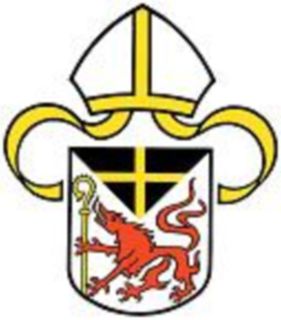
Berthold of Pietengau, also known as Berthold Count von Pietengau in Sigmaringen ( - 1254) was Prince-Bishop of Passau from 1250 to 1254. [1] [2]

Berthold of Pietengau, also known as Berthold Count von Pietengau in Sigmaringen ( - 1254) was Prince-Bishop of Passau from 1250 to 1254. [1] [2]
Berthold was the son of Count Gottfried von Sigmaringen-Helfenstein and Adelheid von Neuffen, daughter of Count Berthold I of Weissenhorn-Neuffen-Achalm-Hettingen. Count Gebhard of Sigmaringen-Pietengau was a brother of Berthold.
Berthold, the brother of Bishop Count Albert I of Pietengau, residing in the Bishopric of Regensburg from 1246 to 1259, was there as assistant Bishop and became the diocesan administrator after the deposition of the Passau bishop Rüdiger von Bergheim. As his opponent Conrad from Silesia withdrew for lack of support, Berthold was able to be elevated to be Bishop of Passau by Pope Innocent IV on 15 June 1250.
In the autumn of 1250 he moved into Passau with difficulties, where the deposed bishop Rüdiger had entrenched himself in the Veste Oberhaus. Thus he was confirmed by the Pope a second time as a bishop. It was not until 1251 that Bishop Nicholas of Újezd, near Prague, was able to give the consecration of priest and bishop. However his relationship with the citizens of Passau remained intact. For Berthold, his good relations with King Ottokar II were also helpful, which strengthened the Bohemian-Austrian influence in the bishopric.

The Diocese of Passau is a Roman Catholic diocese in Germany that is a suffragan of the Archdiocese of Munich and Freising. Though similar in name to the Prince-Bishopric of Passau—an ecclesiastical principality that existed for centuries until it was secularized in 1803—the two are entirely different entities. The diocese covers an area of 5,442 km².

The Prince-Bishopric of Würzburg was an ecclesiastical principality of the Holy Roman Empire located in Lower Franconia west of the Prince-Bishopric of Bamberg. Würzburg had been a diocese since 743. As definitely established by the Concordat of 1448, bishops in Germany were chosen by the canons of the cathedral chapter and their election was later confirmed by the pope. Following a common practice in Germany, the prince-bishops of Würzburg were frequently elected to other ecclesiastical principalities as well. The last few prince-bishops resided at the Würzburg Residence, which is one of the grandest baroque palaces in Europe.

Berthold II, Duke of Carinthia, also known as Berthold I of Zähringen, was a progenitor of the Swabian House of Zähringen. From 1061 until 1077, he was the Duke of Carinthia and Margrave of Verona.
Manegold of Berg was abbot of St. George's Abbey in the Black Forest, Kremsmünster Abbey and Tegernsee Abbey, and Bishop of Passau.

The Prince-Bishopric of Osnabrück) was an ecclesiastical principality of the Holy Roman Empire from 1225 until 1803. It should not be confused with the Diocese of Osnabrück, which was larger and over which the prince-bishop exercised only the spiritual authority of an ordinary bishop. It was named after its capital, Osnabrück.
Konrad I of Głogów, a member of the Silesian Piasts, was Silesian duke of Głogów from 1251 until his death.

Gebhard III was Bishop of Constance and defender of papal rights against imperial encroachments during the Investiture Controversy.

Henry III of Brunswick-Lüneburg was the ruling Prince-Bishop of Hildesheim from 1331 until his death.

Reginhar was the 9th Bishop of Passau.

Egilbert was the 21st Bishop of Passau from 1045 to 1065.

Reginbert of Hagenau also called Raimbert was 1130 provost of the Stift St. Pölten and in 1138 bishop of Passau.

Diepold Count von Berg, also: Theobald, was the 11th Bishop of Passau from 1172 to 1190.
Heinrich von Berg was Bishop of Passau from 1169 to 1171 and Bishop of Würzburg from 1191 to 1197.

Rüdiger von Bergheim was Bishop of Chiemsee from 1216 to 1233 and Bishop of Passau from 1233 to 1250.

Gebhard I. von Plain (Pleyen) was von 1222 till 1232 Bishop of Passau.
Albert I Count of Pietengau was Bishop of Regensburg from 1246 to 1259.

Otto von Lonsdorf was a 13th century Bishop of Passau.

Bernard von Prambach, also known as Wernhard was the 42nd Bishop of Passau from 1285 to 1313.